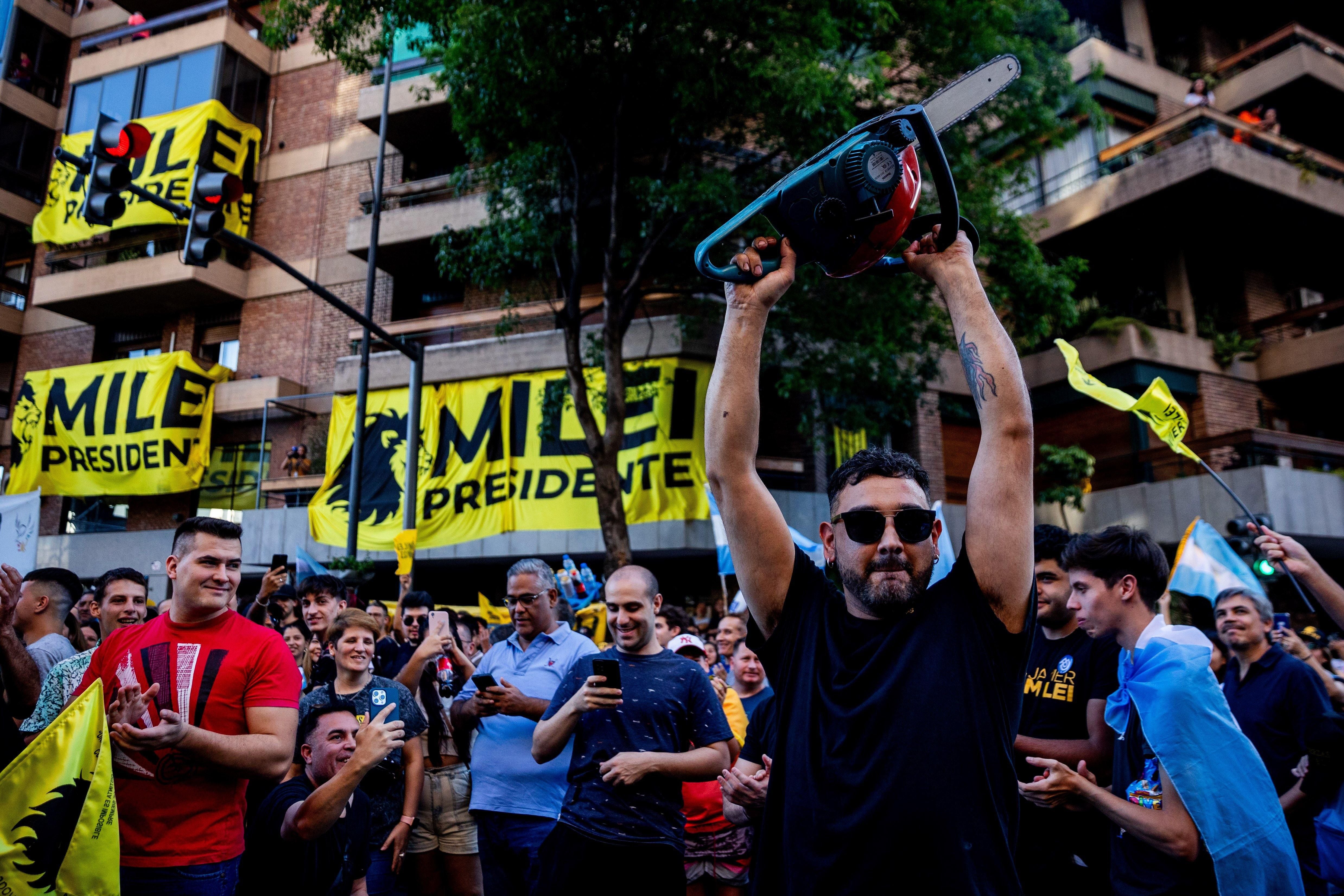:quality(75)/cloudfront-us-east-1.images.arcpublishing.com/elcomercio/GQZDCMRNGEZC2MBZKQYDQORUGI.jpg)
When a patient is very sick, doctors must take drastic measures to save him. From today onwards, patients Argentines They will be subjected to a new shock, perhaps one of the most necessary to be able to see the light at the end of the tunnel and escape the spiral of economic crisis and poverty in which they have found themselves for several years.
TO LOOK: Assunção by Javier Milei LIVE | Last minute of the actions of the new president of Argentina
The rise to power of the libertarian Javier Milei It’s an immense challenge. The economist won the elections resoundingly (56% against the 44% that Peronism obtained) because Argentines knew the need for urgent change and that it was better to take a leap of faith than continue falling into the abyss. That’s why the chainsaw speech had so much impact, despite the other ‘buts’ that surrounded his candidacy.
Milei wore the presidential sash thanks to the fact that during the campaign he said he would close the Central Bank, that he would dollarize the economy and that he would “expel” the political caste. He did not disguise the need for fiscal adjustment and honest prices. But now that he is president, the questions arise: is it feasible to fulfill everything he promised? What will be the consequences of the adjustments? Will Kirchnerism let him govern and apply changes?
Let’s start by deflating the bubble a little. The caste that he denounced so much during the campaign is today an important part of his cabinet. Patricia Bullrich, who was her rival in the first round, is now her Minister of Security, as part of the agreement that Milei had to make with the ranks of former president Mauricio Macri, to gain governability.
His new Economy Minister, who will have the immense task of redirecting public finances, is Luis Caputo, who was also Macri’s former minister and former president of the maligned Central Bank. Names closely linked to his political formation were left behind, La Libertad Avanza, who was left out of several important positions.
Milei has only seven senators and 39 deputies in the national Congress, a tiny amount if he wants his proposals to be approved, so he will need a very good political sense – and a caste – to be able to survive in office.
“For now, some agreements are being reached with some provincial governors that will allow them to vote on laws and guarantee a period of governability. Congress is a place for negotiations and alliances will be forged according to the content of each law that is approved,” political scientist Liliana Díez, graduated in Political Science and Public Administration and member of the Network of Political Scientists, told El El. . Business. from Mendoza.
One of Milei’s main proposals was dollarization. With stratospheric inflation (147% was the year-on-year inflation in October), the national currency has practically no value and is also subject to multiple exchange rates that only distort the market.

However, disappearing the peso is not seen as a simple task, because Milei wants to aim first at cleaning the fiscal deficit (hence the reduction of ministries from 18 to 9), through the privatization of public companies, the liberalization of prices and, above all, of all, to the payment of the debt that the Central Bank has with private banks (the so-called leliqs). Given this, the president has already announced that there will be stagflation (economic stagnation plus inflation) in the coming months.
The latest Focus Economics report projects a “deep economic contraction” with inflation of 260% for the second quarter of 2024 and that the dollar will reach around 1,500 pesos at the end of next year (it is currently at 990 pesos).
In fact, the new president barely talked about dollarization in recent weeks and focused more on the fiscal bills and adjustments that will come over the next two years.
“Dollarization is not something you will implement first. The most sensible thing now is for Congress to approve the reforms that the majority agrees with, such as closing the fiscal gap and reducing the state apparatus. Once more consolidated, we will be able to move on to more complicated issues, such as the closure of the Central Bank and dollarization”, explains Marco Ortiz, professor at the Department of Economics at the University of the Pacific, to El Comercio.

“When economies follow outdated recipes that undergo price controls, they end up having huge distortions because the State interferes in setting prices. Peru went through the same thing, and then came the famous package of [Juan Carlos] Hurtado Miller in 1990″, adds Ortiz. “Price liberalization is complex because we don’t know where these prices will end up and this whole process generates inflation, but the Argentine productive apparatus needs to be reconstituted.”
The Peruvian economist highlights that privatizations and reforms will produce unemployment, since many sectors were only kept afloat by state intervention. “Everything will depend on how quickly the measures and reforms are implemented, but some industries that were previously protected by the State will have to go bankrupt and this process implies, in economic terms, a reallocation of factors. In other words, a lot of people will be out of work”, explains Ortiz.
Thus, one aspect that seems to be the most complicated for the government is dealing with the now Kirchnerist opposition, which has blood in its eyes after losing the elections. And this opposition will not only be faced by Milei in Congress, but also on the streets. The powerful union leaders, although historically linked to Peronism, are also in many cases political leaders of the K, and have already announced that the libertarian government will be brief because they will not hesitate to come out to “defend the workers”.
For Díez, there was a change in Milei’s speech from the campaign to victory in the elections. “He won by saying he would make an adjustment, but that this adjustment would be paid for by the political caste and the prebendary businessmen, that is, the friends of political power. But now it turns out that the chainsaw will come from the side of the workers.”
“What he called a political caste now has a political color, since Milei’s leaders are people known to Argentines because they were in previous liberal governments – Menem’s and Macri’s – so in terms of politics there is not much hope for change,” says the political scientist from Mendoza.
However, the expert stresses that the new government must be given the necessary time to face the crisis and that unions must not act as political parties, but rather assess the needs of their sectors and negotiate.
“Government communication will be fundamental. Without good communication, it is difficult to approve these reforms because we must explain well to the population that they are necessary for Argentina to return to the path of growth and economic well-being”, concludes Ortiz.
Javier Milei has a titanic task, not only because of the great expectations placed on him, but also because of the magnitude of his promises in the midst of the very complex political-economic framework that Argentina represents. Bringing one of the largest countries in South America out of bankruptcy is not easy, especially if the constant judgment of Kirchnerism is at the forefront, a force that has been wounded but not defeated.
Source: Elcomercio
I am Jack Morton and I work in 24 News Recorder. I mostly cover world news and I have also authored 24 news recorder. I find this work highly interesting and it allows me to keep up with current events happening around the world.






